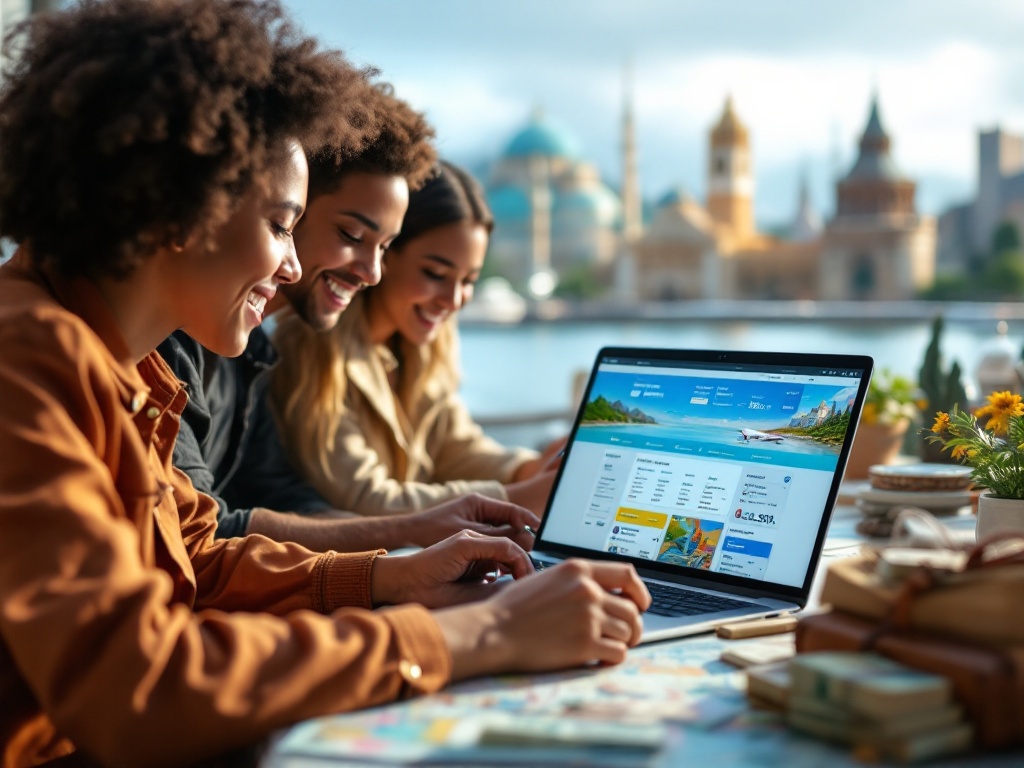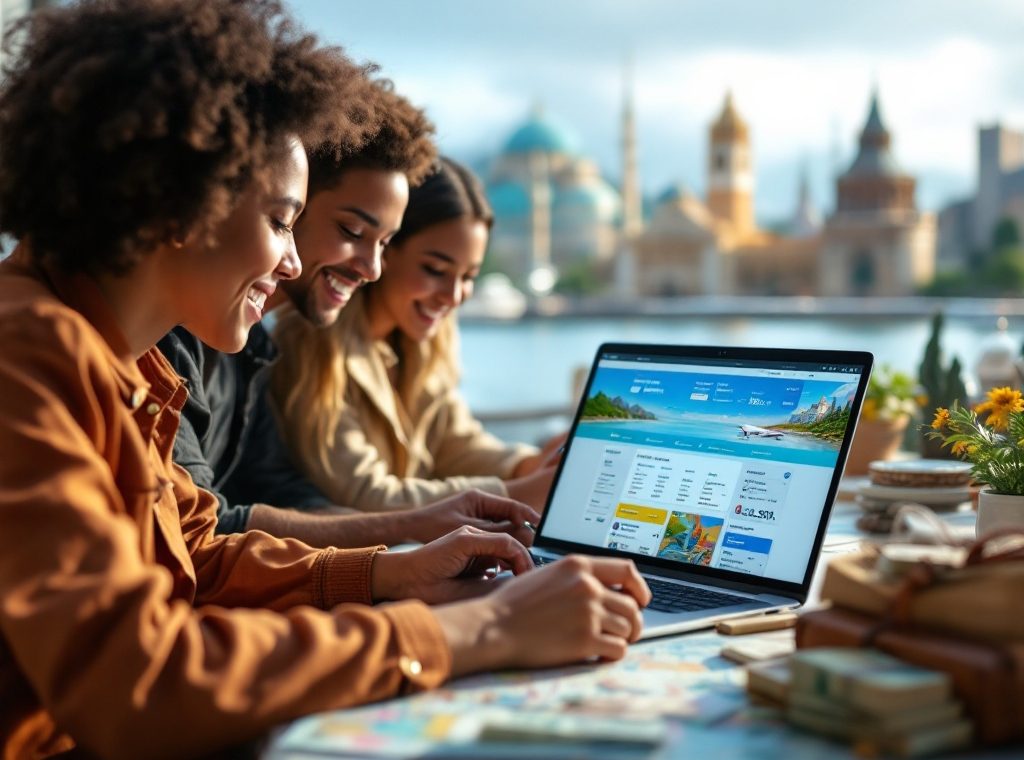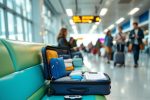Budgeting on the Go: Top Tips for Managing Money While Traveling
Dream of exploring the world without breaking the bank? Learn to create a realistic travel budget that maximizes your adventures while minimizing costs. This guide provides practical tips, from utilizing fare comparison tools like Google Flights and Skyscanner to understanding foreign currency exchange. Discover how budgeting apps and smart spending strategies can help you afford unforgettable experiences. Start planning your dream getaway today!
Important information

- Plan your trip early, comparing flights and hotels, and consider traveling during the off-season for better prices.
- Track spending with budgeting apps, spreadsheets, or physical receipts and adjust your budget as needed.
- When traveling internationally, understand exchange rates, use credit cards wisely (watch for foreign transaction fees), and carry some local cash.
- Prioritize needs like basic food and lodging over wants such as souvenirs or fancy restaurants.
- Prepare for the unexpected with travel insurance and an emergency fund.
Creating a Travel Budget: The First Step for Budgeting on the Go
Planning a trip? A travel budget is key to a stress-free getaway. It helps you prioritize spending, allowing for informed decisions about accommodation, dining, and activities, ultimately leading to a more enjoyable vacation.Effective budgeting allocates funds for essentials like lodging, meals, and transportation, while also setting aside money for exciting experiences. Track your spending using budgeting apps, spreadsheets, or by keeping physical receipts. Regularly reviewing these expenses helps you stay within budget and allows for adjustments if needed. Think of your budget as a financial roadmap, maximizing your trip while preventing overspending.
How to Create a Realistic Travel Budget
Planning a trip effectively involves budgeting for several key aspects: transportation, accommodation, meals, activities, and souvenirs. Research your destination to understand typical prices for these items. A budgeting app or spreadsheet can help track expenses and set a daily spending limit. It’s also crucial to include an emergency fund for unexpected costs. Remember to review and adjust your budget regularly as needed.
Planning Ahead to Save Money on Travel
Planning your trip is the first step to saving money on travel. Research destinations early and compare flight and hotel prices to create a realistic budget. Booking during the off-season or considering alternative airports can often lead to significant savings. Think about transportation options at your destination, as public transit or ride-sharing services are typically cheaper than taxis.
Look for free activities or discounts on attractions. Packing light helps avoid baggage fees, which can add up quickly. Preparing some of your own meals can significantly reduce food costs.
Consider travel insurance, while it’s an added expense upfront, it can protect you from potentially high costs associated with lost luggage or medical emergencies. This provides peace of mind during your travels.
Utilizing Fare Comparison Tools for Airfare Savings
Discover the best flight deals with fare comparison tools. These tools gather information from various airlines and travel agencies, allowing you to easily compare prices across different routes and travel dates. Some popular options include Google Flights, Skyscanner, and Kayak.
Understanding Currency: Key to Effective Money Management
When you’re traveling internationally, understanding the local currency is crucial for managing your finances. Compare its value to your home currency to budget effectively and avoid overspending. While credit cards are convenient, be mindful of foreign transaction fees that some issuers charge. It’s also wise to carry some local cash, especially for smaller businesses and remote areas that may not accept cards. Here’s a quick guide to help you navigate foreign currency:
Understanding Exchange Rates
Before your trip, research the current exchange rate between your home currency and the local currency of your destination. This will give you a baseline understanding of how much your money is worth in the local currency.
Using Credit Cards Abroad
Credit cards can be a convenient way to pay for expenses while traveling internationally. However, be aware of foreign transaction fees, which are typically around 3% of each purchase. Check with your credit card issuer to see if they charge these fees and if they offer any travel-specific credit cards with lower fees or no fees at all.
Carrying Local Cash
It’s always a good idea to have some local cash on hand, especially when traveling to smaller towns, rural areas, or street markets where credit cards may not be accepted. You can exchange currency at your bank, airport kiosks, or currency exchange bureaus.
Tips for Managing Foreign Currency
- Notify your bank and credit card companies of your travel dates to avoid any issues with your cards being blocked.
- Consider using a prepaid travel card that you can load with local currency before your trip.
- Use ATMs to withdraw local currency, as this is often a more cost-effective option than exchanging cash at bureaus.
Local Currency and Exchange Rate Awareness
Research exchange rates before your trip. Airport and tourist spot exchanges usually offer poor rates, so avoid them.
ATMs often provide better value. Notify your bank of your travel dates to prevent issues.
Have some local currency on hand for immediate expenses upon arrival, such as taxi fares.
Stay aware of exchange rate fluctuations.
Getting Foreign Cash: When and How
Traveling internationally? While credit cards are widely accepted, cash is still king in many local markets and smaller establishments. Pre-trip currency exchange offers convenience, but airport kiosks often charge a premium. For better rates, withdraw cash from an ATM upon arrival. Remember to check with your bank about international fees. A debit card with free international withdrawals can be a real money-saver. Keep a small amount of US dollars on hand for unexpected situations.
Check with your bank about international ATM fees and consider a debit card with free international withdrawals. This can save you money compared to exchanging currency before your trip or at airport kiosks.
Withdraw cash from an ATM upon arrival at your destination. This typically offers better exchange rates than pre-trip exchanges or airport kiosks.
Keep a small amount of US dollars on hand. This can be helpful in unexpected situations where credit cards aren’t accepted or ATMs are unavailable.
Using Credit Cards Wisely: Avoiding Foreign Transaction Fees
Traveling abroad? Save money by using a credit card without foreign transaction fees. Travel cards are an excellent choice, often waiving these fees and offering valuable travel rewards. Notify your bank of your trip to avoid any card usage problems. Also, stick to your bank’s ATMs to minimize fees and always select local currency at the machine. This sidesteps dynamic currency conversion, ensuring a more favorable exchange rate and ultimately saving you money. Here’s how to optimize your finances for international travel:
Choose the right card. Opt for a credit card with no foreign transaction fees, ideally a travel card for added rewards.
Inform your bank. Notify your bank of your travel dates and destinations to prevent any issues with card usage.
Use your bank’s ATMs. Stick to your bank’s ATMs whenever possible to minimize ATM fees.
Select local currency. Always choose to be charged in the local currency at ATMs and points of sale. This avoids dynamic currency conversion, which often leads to less favorable exchange rates.
Managing Expenses: Essential Tips for Travelers
Travel budgeting is essential for a stress-free trip. Avoid overspending by carefully monitoring your expenses. Use budgeting apps, spreadsheets, or keep all your receipts for a manual tally. Prioritize needs over wants to effectively manage your money. Consider which experiences are must-haves and which are optional. Don’t forget to factor in major expenses like accommodation, food, and transportation from the outset. Here’s a simple guide to get you started:
Estimate your travel costs. Research and estimate costs for flights, accommodation, activities, and food. This will give you a baseline budget to work with.
Set a daily spending limit. Divide your total budget by the number of travel days to determine a daily spending allowance. This helps you stay on track and avoid overspending.
Track your expenses. Use a budgeting app, spreadsheet, or notebook to monitor your spending throughout your trip. This will help you identify areas where you can save money.
Be flexible with your plans. Be prepared to adjust your itinerary or activities if you find yourself exceeding your budget. There are often free or low-cost alternatives to expensive tourist attractions.
Enjoy your trip! Budgeting doesn’t mean sacrificing fun. It simply means being mindful of your spending so you can make the most of your travel experience without financial stress.
Tracking Your Spending: Tools and Methods
Manage your travel budget effectively with these tips:
Use budgeting apps or spreadsheets to record your daily expenses. This helps you stay organized and aware of your spending.
Save and categorize your receipts, noting expenses for accommodation, food, transport, and activities. This allows for a detailed breakdown of your spending.
Review your budget daily and make adjustments as needed. This will help you stay on track and avoid overspending.
Take photos of your receipts for a convenient and organized record. This also serves as a backup in case you lose the physical receipts.
Prioritizing Your Spending: Needs vs. Wants
Understanding the difference between needs and wants is crucial for smart spending. Food and shelter are essential needs—think simple meals and a safe place to stay. Wants, on the other hand, are those enjoyable extras like souvenirs or entertainment, but they aren’t necessary. By categorizing your expenses, you can stick to your travel budget and make your money last longer, ultimately getting more out of your trip. For example:
Needs
- Accommodation (hostel, budget hotel),
- Food (groceries, simple meals),
- Transportation (public transport, walking).
Wants
- Dining out (restaurants, cafes),
- Entertainment (shows, tours),
- Souvenirs.
By prioritizing your needs, you can stretch your travel budget further and experience a more fulfilling trip.
Accounting for Major Expenses: Food, Accommodation, and Transportation
Managing your travel spending effectively can make your trips more enjoyable. Track your expenses using budgeting apps or spreadsheets to understand where your money goes, categorizing costs like accommodation, food, and transport. For affordable travel, consider these tips:
Transportation
Choose local buses and trains over taxis or ride-sharing services for budget-friendly travel.
Accommodation
Explore hostels, guesthouses, and home-sharing for cost-effective lodging.
Food
Embrace local cuisine at local eateries and markets, which are typically cheaper than tourist-oriented restaurants. Prepare your own meals whenever possible to save significantly on food costs.
Tools and Apps for Budgeting on the Go
Budgeting apps are essential for managing travel expenses, allowing you to easily track spending and stay within budget. You can input and categorize expenses, monitoring your budget in real-time for complete control.Accurate budgeting abroad requires currency converters, which provide current exchange rates for precise calculations. Popular choices like XE Currency and Currency Converter Plus help travelers avoid overspending and simplify managing money abroad, offering peace of mind by showing exactly where your money is going. Using these tools, you can accurately estimate costs, convert currencies, and track your spending, making your travel budget more effective.
Budgeting Apps for Tracking Expenses
Take control of your finances with budgeting apps like Mint, YNAB (You Need A Budget), and Personal Capital. These apps connect directly to your bank accounts and credit cards, providing real-time expense tracking and categorization to reveal your spending habits. This allows you to see exactly where your money is going. Some apps offer extra features like spending limits and alerts. Features vary across different apps.
Using Currency Converters for Accurate Spending
Currency converters are essential tools for travelers to understand the true cost of goods and services. When encountering a foreign price tag, it can be challenging to immediately grasp its equivalent in your home currency. A currency converter bridges this gap by displaying the price in familiar terms, preventing accidental overspending. By providing real-time exchange rates, these tools empower you to compare prices effectively and make informed purchasing decisions. Accessing a currency converter is easy, as they are readily available online and as mobile apps. Some credit cards even offer built-in conversion features for added convenience.
Saving Money on Accommodations and Activities
Budget-Friendly Accommodation
Looking to save on accommodation? Hostels and guesthouses are excellent budget-friendly options. Hostels typically offer dorm-style rooms and shared bathrooms, while guesthouses provide more privacy with simple rooms and basic amenities. Both often feature shared kitchens and common areas, perfect for meeting fellow travelers.
- Generator Hostels, known for their stylish and social atmosphere.
- St. Christopher’s Inns, offering a wide range of locations and amenities.
- The Green Tortoise Hostel, providing a unique and community-focused experience.
- Equity Point Hostels, blending budget-friendly accommodation with social events and activities.
Free and Low-Cost Activities
Traveling on a shoestring? Many destinations boast a wealth of free or inexpensive activities.
- Explore local parks and gardens.
- Delve into history at museums and historical sites on free admission days or at reduced rates.
- Hike scenic trails and enjoy the natural beauty.
- Join free walking tours to discover a city’s hidden gems.
- Visit bustling local markets and soak up the atmosphere.
- Enjoy free concerts or street performances.
Affordable Transportation
Getting around affordably is easy with public transport. Utilize buses, trains, or subways rather than expensive taxis. Research the local options and consider a travel pass for multiple journeys. For shorter distances, walking or cycling is not only economical but also environmentally friendly.
Opting for Budget Accommodations: Hostels and Guesthouses
Traveling on a budget? Consider these alternatives to hotels:
Hostels and Guesthouses
Hostels and guesthouses are budget-friendly options for travelers. they offer basic accommodations at affordable prices.
Vacation Rentals
Vacation rentals are an excellent choice, often including kitchens. this allows you to prepare meals and save money. they also provide more space and privacy than hotel rooms. however, some rentals may require a minimum stay (e.g., a week), so consider your trip length when booking.
Finding Free and Low-Cost Attractions
Explore free activities such as visiting parks and museums on free admission days. Discover historic neighborhoods with free walking tours, which offer a great introduction to the area. Find free events like concerts, festivals, and community gatherings. Check websites and apps that list these and other budget-friendly attractions. For discounts, look for coupons or city passes that bundle attractions at a reduced price. Don’t hesitate to ask locals for their tips on affordable activities.
Utilizing Public Transportation for Cost-Effective Travel
Public transportation offers a budget-friendly way to travel. Buses and trains are significantly cheaper than taxis or rental cars. For shorter distances, walking or cycling provides even greater savings. If available, consider a travel pass for unlimited rides within a specific timeframe, potentially saving you a considerable amount.
Additional Tips for Budget Travelers
Pack only the essentials, using travel-sized toiletries and versatile clothing items to avoid checked baggage fees and save money.
Discover travel deals and discounts by researching flights, accommodations, and activities online. Utilize travel websites, apps, and email alerts for the best bargains.
Extend your travel budget by working as you go. Remote work, temporary jobs, teaching English abroad, freelancing, or seasonal work can cover your expenses.
Unexpected costs can arise, so have a backup plan. A contingency fund helps cover emergencies like medical issues or flight cancellations. Travel insurance is also recommended to minimize financial risks.
Packing Light to Avoid Extra Baggage Fees
Pack light and bring only essential items. A mix-and-match wardrobe maximizes outfit options while minimizing luggage, saving you money on baggage fees and making your trip more enjoyable.
Looking for Travel Deals and Discounts
Planning a trip on a budget can be easier than you think. Here’s how to make the most of your travel funds:
Find the Best Deals
- Check online travel agencies, coupon websites, and loyalty programs for discounts on flights and hotels.
- Subscribe to travel newsletters and follow social media accounts specializing in travel deals to stay updated on the latest promotions.
Choose Affordable Accommodations
Consider budget-friendly options like hostels, guesthouses, or home-sharing platforms. These alternatives often provide comfortable lodging at a fraction of the price of traditional hotels.
Embrace Free Activities
Explore your destination on foot with walking tours, visit local parks, and take advantage of free admission days at museums and cultural attractions.
Smart Transportation Choices
Instead of expensive taxis, opt for public transport or ride-sharing services. These options can significantly reduce your transportation costs while still allowing you to explore your destination effectively.
Pack Light and Save
Packing light helps avoid checked baggage fees. It also makes navigating public transport and exploring on foot more convenient.
Prepare Your Own Meals
Preparing some of your own meals can significantly cut down on restaurant expenses. Consider packing snacks and simple meals for day trips or enjoying picnics in local parks.
Working While Traveling to Extend Your Budget
Want to travel long-term and earn money? Working remotely can make this a reality. Freelancing online offers great flexibility, and teaching English online is always a popular option.
Seasonal work in the tourism industry is another possibility. Think about your skills and what you can offer remotely. Research job opportunities specific to your desired destinations, and turn your travel dreams into your next big adventure.
Here’s how to make it happen:
Identify your skills. What are you good at? What services can you offer remotely? Examples include writing, graphic design, web development, virtual assistance, and online tutoring.
Research online job platforms. Websites like Upwork, Fiverr, and Freelancer.com connect freelancers with clients worldwide.
Consider teaching English online. This is a high-demand field with opportunities to work with students from all over the world.
Explore seasonal tourism jobs. If you enjoy working in hospitality or tourism, look for seasonal positions in your desired travel destinations.
Research destination-specific opportunities. Look for job boards, networking groups, and online communities related to your target destinations.
Avoiding Unexpected Costs: Building a Backup Plan
Travel is full of surprises, and not all of them are pleasant. Flights get cancelled, illnesses can strike unexpectedly, and luggage sometimes disappears. These unforeseen hiccups can quickly derail your travel budget. A well-structured backup plan, however, can significantly lessen the impact of such events. Travel insurance is essential to any such plan. It can cover overseas medical expenses, reimburse you for lost luggage, and even compensate you for cancelled trips. This safety net provides invaluable peace of mind.
Why you need a backup plan?
Imagine your flight is cancelled, leaving you stranded in a foreign airport. Or perhaps you fall ill and require medical attention abroad. Maybe your luggage gets lost, containing essential medications or valuable items. These situations can not only disrupt your travel plans but also lead to significant unexpected expenses. A comprehensive backup plan can help you navigate these challenges and mitigate the financial burden they may impose.
How to create a robust backup plan?
- Secure travel insurance: choose a policy that covers medical emergencies, trip cancellations, lost luggage, and other potential risks,
- Establish an emergency fund: set aside a dedicated amount of money specifically for unexpected travel expenses. This can be a lifesaver if your card gets declined or you encounter unforeseen costs,
- Keep essential documents readily accessible: store copies of your passport, visa, insurance policy, and other important documents in a secure, easily accessible location, both physically and digitally,
- Inform your bank and credit card companies of your travel plans: this will prevent your cards from being blocked due to suspicious activity,
- Research your destination: familiarize yourself with local customs, laws, and emergency contact information.











